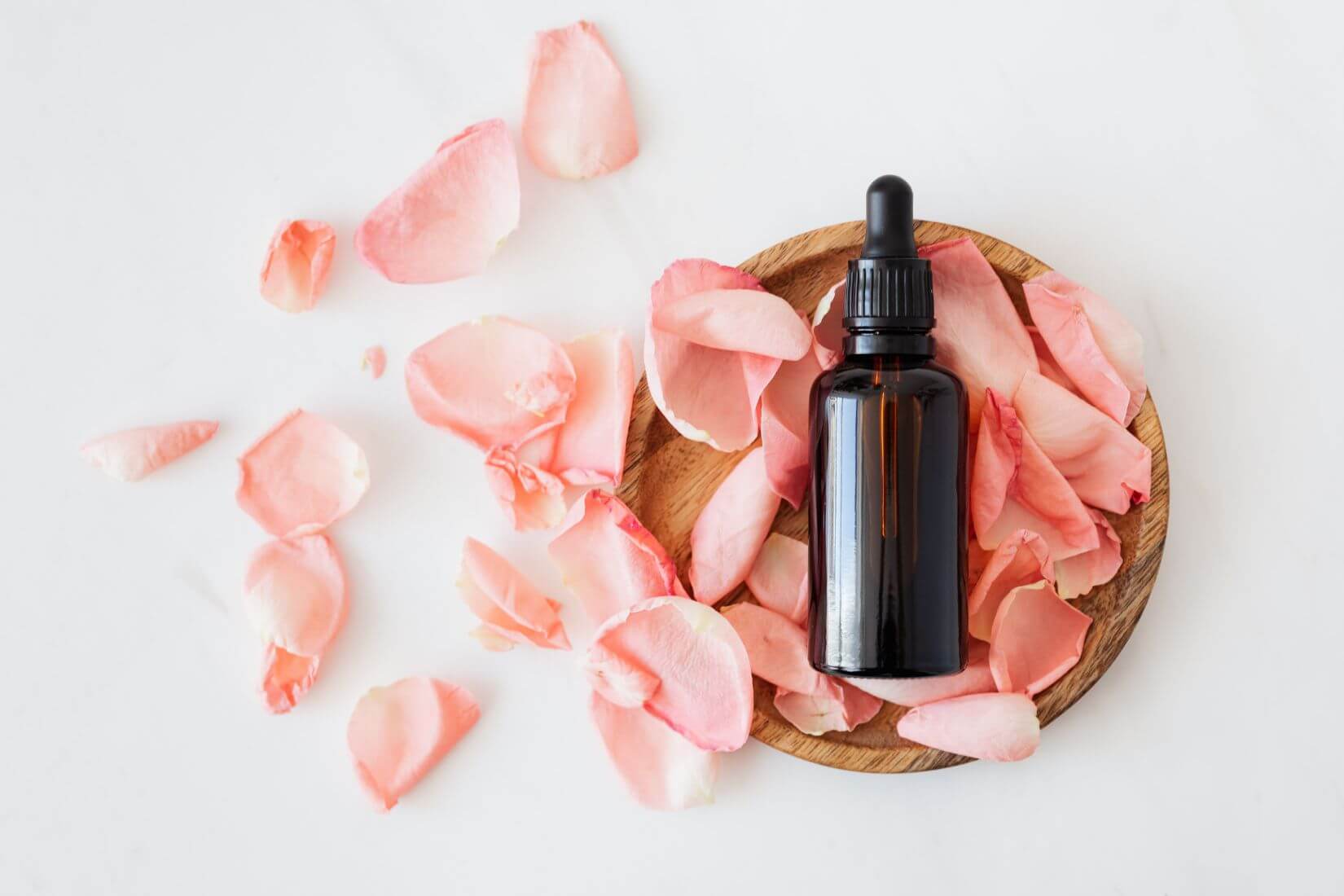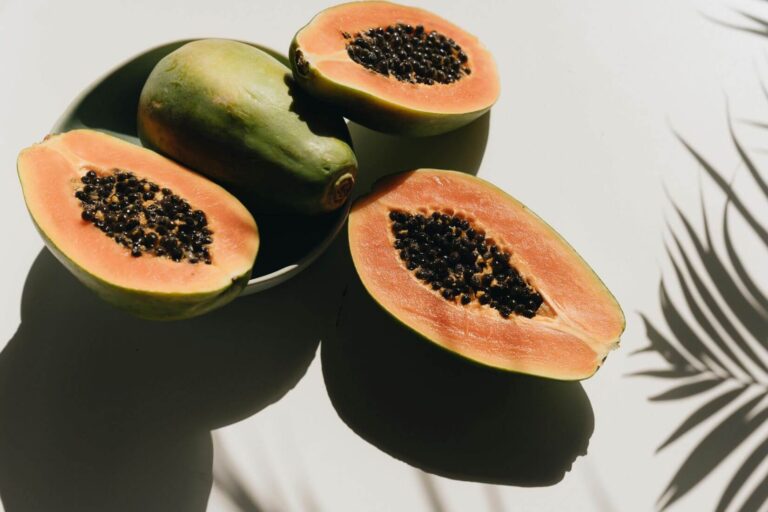10 Best Essential Oils for Meditation + DIY Oil Blends
Meditation, as we all know, is a beautiful journey inward, a moment of peace and introspection in our often hectic lives. But what if I told you there’s a way to make this journey even more profound? Enter the world of essential oils for meditation. These aromatic wonders have been used for centuries to elevate spiritual practices, and in this post, we’ll explore how they can enhance your meditation sessions. Whether you’re a seasoned meditator or just starting out, integrating essential oils can offer a sensory experience that deepens your connection to the present moment.
Let’s dive deeper into the aromatic world of essential oils and discover how they can transform our meditation experience.
The Science Behind Essential Oils and Meditation
The fascinating world of essential oils goes beyond their pleasant aromas. These oils have a deep-rooted connection with our physiology and psychology, making them perfect companions for meditation. But how exactly do they work? Let’s delve into the science behind it.
Brain Waves and Aromatherapy
When we inhale the aroma of an essential oil, the scent molecules travel through our nostrils to the olfactory bulb, which is part of our brain’s limbic system. This system is often referred to as the “emotional brain” and plays a crucial role in our moods, emotions, and memories. According to a study published in the Journal of Environmental Psychology, certain scents can influence brain activity, promoting relaxation and reducing stress.
Neurotransmitters and Mood Regulation
Essential oils can also influence the release of neurotransmitters like serotonin and dopamine. For instance, lavender oil is known to increase the production of serotonin, often termed the “feel-good” hormone. This was highlighted in a 2013 study in the Journal of Alternative and Complementary Medicine, where participants who inhaled lavender oil showed a significant decrease in stress and anxiety levels.
Cultural and Historical Significance
Historically, cultures around the world have incorporated aromatic plants and oils into their spiritual practices. Frankincense, for example, has been used in religious ceremonies for thousands of years, and its calming effects are well-documented in ancient texts.

Top 10 Essential Oils for Meditation
The world of essential oils is vast, but when it comes to meditation, some oils stand out more than others. Here’s a closer look at some of the top essential oils that can elevate your meditation sessions.
1. Lavender
Lavender is often referred to as the “universal oil” because of its versatile nature. Its soft, floral aroma has a calming effect, making it a favorite for many meditation practitioners. Whether you’re looking to ease your mind after a long day or find solace in a moment of introspection, lavender can be your aromatic companion.
Aroma: Soft, floral, and calming.
Characteristics:
- Known for its relaxing properties.
- Often used to combat anxiety and stress.
- Promotes a peaceful sleep.
- Can balance the body’s energy centers or chakras.
2. Frankincense
With its deep and resinous scent, frankincense transports you back to ancient times where it was considered more valuable than gold. Used in religious and spiritual rituals for centuries, frankincense aids in deepening your meditation, allowing for a profound connection with the self.
Aroma: Deep, resinous, and slightly spicy.
Characteristics:
- Historically significant in spiritual rituals.
- Enhances introspection and self-reflection.
- Supports respiratory health.
- Grounds the mind, promoting focus during meditation.
3. Sandalwood
Sandalwood, with its earthy and woody aroma, is like an anchor that grounds you in the present moment. It’s a bridge between the earthly and the divine, making your meditation sessions a journey of inner discovery and clarity.
Aroma: Woody, earthy, and slightly sweet.
Characteristics:
- Offers a grounding effect, connecting you to the present.
- Boosts mental clarity.
- Encourages a sense of inner peace.
- Historically used in spiritual ceremonies across various cultures.
4. Ylang Ylang
Imagine walking through a lush tropical garden, with the intoxicating scent of blooming flowers enveloping you. That’s the essence of Ylang Ylang. Its sweet and floral aroma is like a gentle caress, inviting you to let go of your worries and immerse yourself in the joy of the present moment.
Aroma: Sweet, floral, and slightly fruity.
Characteristics:
- Celebrated for its uplifting properties.
- Helps in reducing feelings of stress and anxiety.
- Promotes a sense of well-being and joy.
- Balances both mind and body.
5. Vetiver
Imagine standing at the edge of a serene lake, the cool and smoky mist rising at dawn. Vetiver’s deep and earthy aroma embodies this tranquility. It’s an anchor, grounding you firmly in the present, allowing your mind to find stillness amidst the chaos of life.
Aroma: Deep, smoky, and earthy.
Characteristics:
- Incredibly grounding and centering.
- Perfect for deepening meditation practices.
- Helps in stabilizing emotions.
- Promotes a sense of rootedness in the present moment.
6. Cedarwood
Imagine being amidst a forest of tall cedar trees, the scent of wood surrounding you, bringing warmth and comfort. Cedarwood’s aroma is just that – warm, woody, and comforting. It’s an invitation to let go of external distractions and dive deep into the realms of your mind.
Aroma: Warm, woody, and comforting.
Characteristics:
- Deeply calming and grounding.
- Often linked with spiritual growth.
- Supports healthy respiratory function.
- Can help in clearing mental clutter.
7. Patchouli
Envision yourself in an ancient forest, the earthy aroma of the damp ground and aged trees filling the air. Patchouli captures this very essence. Its musky and earthy scent is a bridge to our primal roots, encouraging a deep sense of connection and grounding during meditation.
Aroma: Earthy, musky, and slightly sweet.
Characteristics:
- Known for its grounding and balancing effects.
- Often used to enhance spiritual connection.
- Supports emotional release and calmness.
- Aids in centering the mind during meditation.
8. Myrrh
Picture a sacred temple, where the air is thick with the warm and spicy scent of incense. Myrrh, with its rich and balsamic aroma, transports you to such sacred spaces. It’s a reminder of age-old rituals and spiritual practices, guiding you to a place of introspection and reverence.
Aroma: Warm, spicy, and slightly balsamic.
Characteristics:
- Historically used in spiritual rituals.
- Enhances introspection and deep meditation.
- Supports emotional balance and tranquility.
- Often paired with frankincense for a synergistic effect.
9. Rose
The scent of rose is like a poetic embrace. It’s rich, floral, and envelops you in feelings of love and compassion. In meditation, rose oil can open your heart, allowing you to embrace emotions, both pleasant and painful, with grace.
Aroma: Rich, floral, and romantic.
Characteristics:
- Associated with the heart chakra, promoting emotional balance.
- Encourages feelings of love and compassion.
- Can uplift the spirit, combating feelings of sadness.
- Historically symbolized purity and spiritual enlightenment.
10. Chamomile
Picture a serene meadow with blooming chamomile flowers, their gentle aroma wafting through the air. Chamomile’s light and soothing scent is reminiscent of this tranquility. It’s like a gentle whisper, reminding you to let go, relax, and be in the moment.
Aroma: Light, apple-like, and soothing.
Characteristics:
- Renowned for its calming and soothing properties.
- Supports digestive health.
- Aids in relaxation before sleep.
- Helps in reducing feelings of irritability or anger.
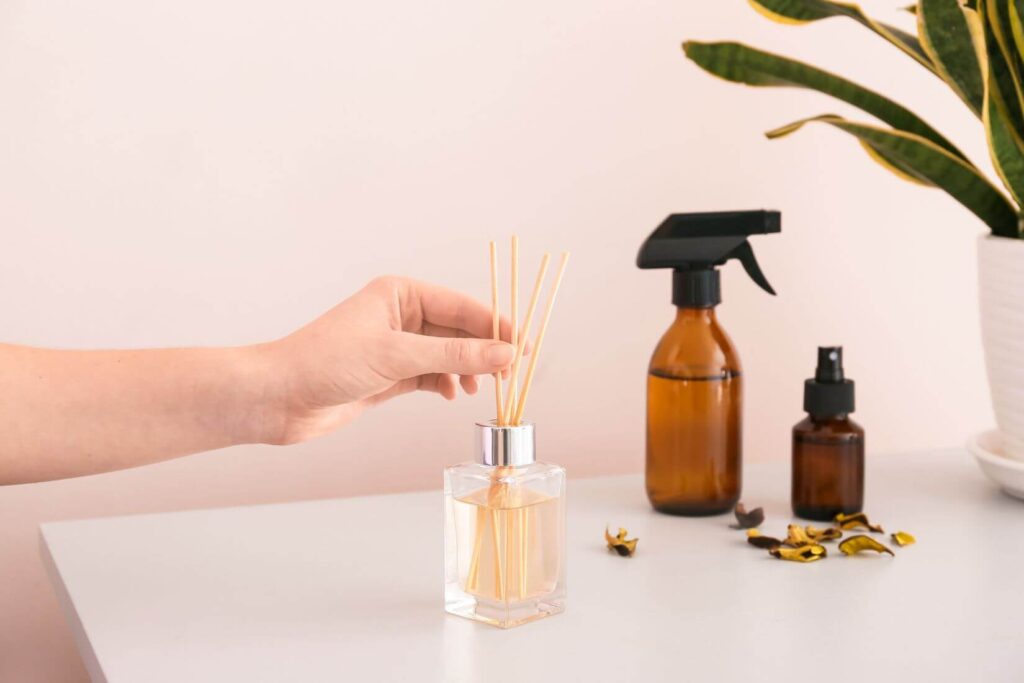
How to Use Essential Oils for Meditation
Integrating essential oils into your meditation practice can be a transformative experience, but it’s essential to know the right ways to use them to reap their full benefits. Here’s a detailed guide on how to incorporate these aromatic wonders into your sessions.
Diffusing in the Room
Using a diffuser is one of the most popular methods to enjoy essential oils. Add a few drops of your chosen oil to the diffuser filled with water, and let the aroma permeate your meditation space. The gentle mist not only fills the room with a pleasant scent but also sets the mood for a calming meditation session.
RELATED POST: 6 BEST MEDITATION TOOLS FOR BEGINNERS
Applying Topically
Before you apply any essential oil directly to your skin, it’s crucial to dilute it with a carrier oil like coconut or almond oil. Once diluted, you can massage it onto your temples, wrists, or the back of your neck. This method allows the oil to interact directly with your body, enhancing its effects during meditation.
Creating a Meditation Spray
Combine water, a bit of alcohol or witch hazel, and your favorite essential oils in a spray bottle. Shake well and spritz around your meditation area or even on your body. This method is great for creating a refreshing and calming atmosphere instantly.
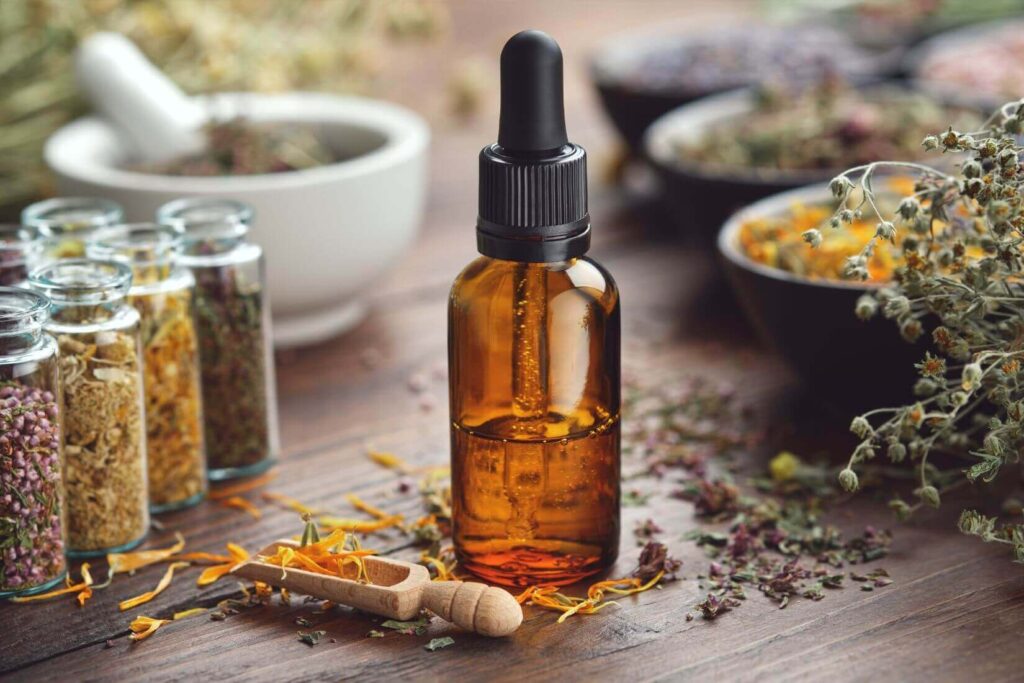
DIY Meditation Essential Oil Blends
Crafting your own essential oil blends can be a rewarding experience. Not only do you get to experiment with different aromas, but you also create a blend that’s uniquely tailored to your meditation needs. Here are some blends to inspire your aromatic journey.
Calming Blend
Ingredients:
- Lavender (5 drops)
- Chamomile (3 drops)
- Ylang Ylang (2 drops)
This blend is perfect for winding down after a hectic day. The soothing properties of lavender and chamomile, combined with the uplifting aroma of Ylang Ylang, create a harmonious balance that calms the mind and prepares it for a deep meditation session.
Grounding Blend
Ingredients:
- Sandalwood (4 drops)
- Cedarwood (4 drops)
- Vetiver (2 drops)
If you’re seeking a blend that roots you firmly in the present moment, this is it. The earthy notes of sandalwood and cedarwood, paired with the deep aroma of vetiver, create a grounding atmosphere, helping you connect deeply with your surroundings and inner self.
Uplifting Blend
Ingredients:
- Rose (4 drops)
- Frankincense (3 drops)
- Patchouli (3 drops)
This blend is a harmonious fusion of emotions. The heart-opening qualities of rose, the spiritual depth of frankincense, and the grounding yet uplifting nature of patchouli come together to elevate your spirit and enhance your meditation experience.
Tips for Crafting Your Blends
- Start Small: When experimenting, start with small batches. This way, you can adjust the ratios easily if needed.
- Storage: Store your blends in dark glass bottles to protect them from sunlight, which can degrade the oils.
- Labeling: Always label your blends with the ingredients and the date of creation. This helps in keeping track and replicating your favorite combinations.
- Safety First: Always do a patch test when trying out a new blend to ensure you don’t have any adverse reactions.
Pin these best essential oils for meditation for later!
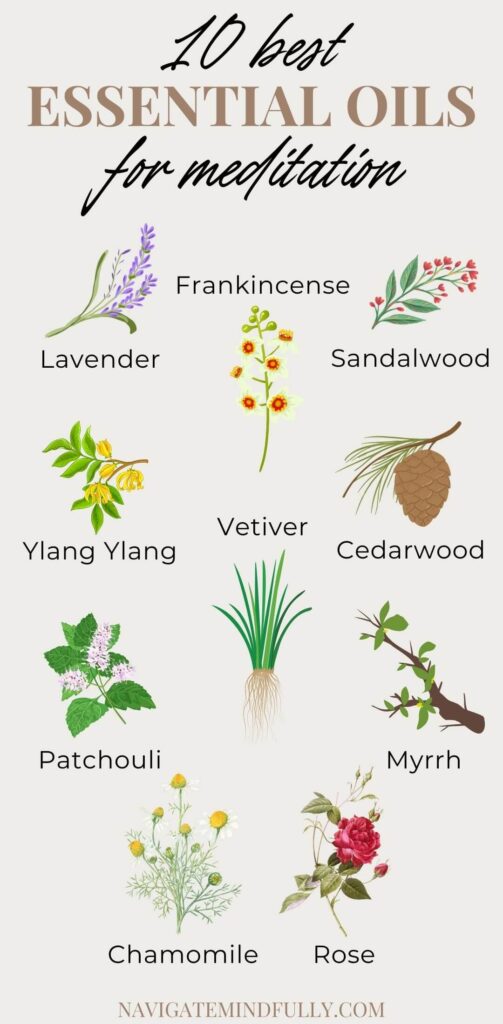
Final Thoughts
Meditation, in its essence, is a journey inward—a sacred space where we connect with our deepest selves. The addition of essential oils to this practice is like adding color to a canvas; it enhances, deepens, and enriches the experience. Each oil, with its unique aroma and properties, offers a different path to explore within this vast inner landscape.
Remember, the beauty of meditation and aromatherapy lies in personalization. What resonates with one person might differ for another. So, take your time, experiment, and find the scents that speak to your soul. Trust your intuition, and let it guide you to the oils that align with your meditation goals.

